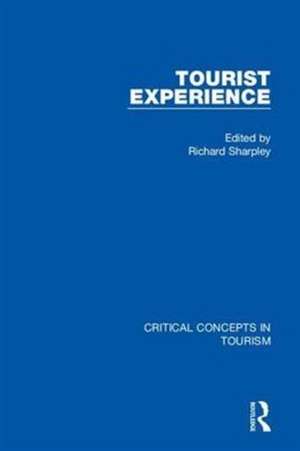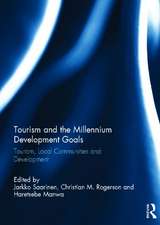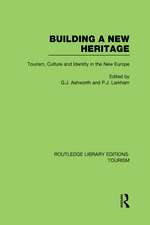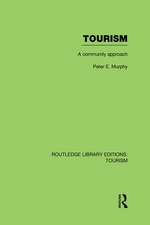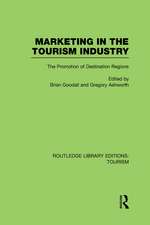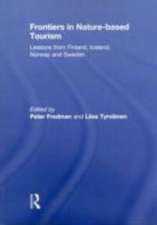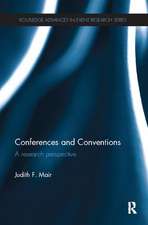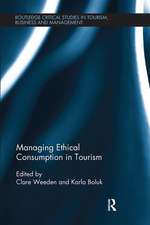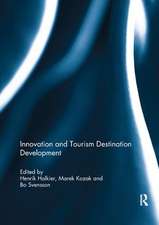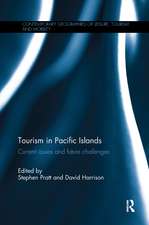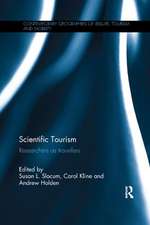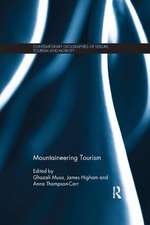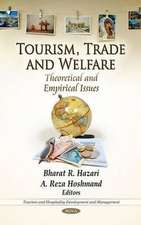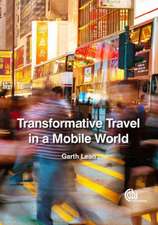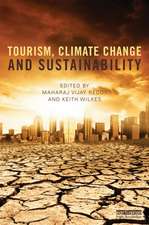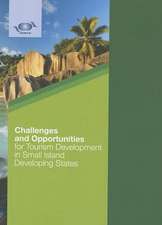Tourist Experience: Critical Concepts in Tourism
Editat de Richard Sharpleyen Limba Engleză Hardback – 30 sep 2016
Now, Tourist Experience, a new collection of major works from Routledge, meets a growing need for a comprehensive reference work that embraces both established themes and issues with emergent debates and research. The gathered materials have been carefully selected from a broad range of academic journals, edited collections, and other sources, and are organized around three broad themes: the significance/meaning of tourism in contemporary society; tourist motivation and demand; and tourist roles. With a comprehensive introduction, newly written by the editor, which places the collected material in its historical and intellectual context, Tourist Experience is an essential reference work and vital research resource for scholars, researchers, and students in tourism and related disciplines.
Preț: 6693.08 lei
Preț vechi: 10183.80 lei
-34% Nou
Puncte Express: 10040
Preț estimativ în valută:
1280.69€ • 1340.76$ • 1059.71£
1280.69€ • 1340.76$ • 1059.71£
Carte tipărită la comandă
Livrare economică 05-19 aprilie
Preluare comenzi: 021 569.72.76
Specificații
ISBN-13: 9781138931978
ISBN-10: 1138931977
Pagini: 1654
Dimensiuni: 156 x 234 x 106 mm
Greutate: 0.45 kg
Ediția:1
Editura: Taylor & Francis
Colecția Routledge
Seria Critical Concepts in Tourism
Locul publicării:Oxford, United Kingdom
ISBN-10: 1138931977
Pagini: 1654
Dimensiuni: 156 x 234 x 106 mm
Greutate: 0.45 kg
Ediția:1
Editura: Taylor & Francis
Colecția Routledge
Seria Critical Concepts in Tourism
Locul publicării:Oxford, United Kingdom
Public țintă
Postgraduate and UndergraduateCuprins
Volume 1
Part 1: Conceptualising the tourist experience
Part 1: Conceptualising the tourist experience
- S. Quinlan-Cutler and B. Carmichael, ‘Dimensions of the Tourist Experience’, in M. Morgan, P. Lugosi and J. Ritchie, eds., The Tourism and Leisure Experience: Consumer and Managerial Perspectives,( Bristol: Channel View Publications, 2010), pp.3-26.
- Chris Ryan, ‘Ways of Conceptualizing the Tourist Experience: A review of literature’, Tourism Recreation Research, 35, 1, 2010, pp.37-46.
- Seppo K. Aho, ‘Towards a General Theory of Touristic Experiences: Modelling Experience Process in Tourism’, Tourism Review, 56, 3-4, 2001, pp. 33-37.
- Serena Volo, ‘Conceptualizing Experience: A tourist Based Approach’, Journal of Hospitality Marketing & Management, 18, 2-3, 2009, pp .111-126.
- Betsy Wearing and Stephen Wearing, ‘Refocussing the Tourist Experience: The Flaneur and the Chorister, Leisure Studies, 15, 1996, pp. 229-243.
- Natan Uriely, ‘The Tourist Experience: Conceptual Developments’, Annals of Tourism Research, 32, 1, 2005, pp. 199-216.
- Svein Larsen, ‘Aspects of a Psychology of the Tourist Experience’, Scandinavian Journal of Hospitality and Tourism, 7, 1, 2009, pp. 7-18.
- Sebastian Filep and Margaret Deery, ‘Towards a Picture of Tourists’ Happiness’, Tourism Analysis, 15, 4, 2020, pp. 399-410.
- Jeroen Nawijn, ‘The Holiday Happiness Curve: A Preliminary Investigation into Mood during a Holiday Abroad’, International Journal of Tourism Research, 12, 2012, pp. 281-290.Part 2: Tourism in contemporary society
- Jost Krippendorf, ‘Tourism in the System of Industrial Society’, Annals of Tourism Research, 13, 4, 1986, pp. 517-532.
- Graham Henning, ‘The Habit of Tourism: Experiences and their Ontological Meaning’, in R. Sharpley and P. Stone, eds., Contemporary Tourist Experience: Concepts and Consequences (Abingdon: Routledge, 2012), pp.25-37.
- John Urry, ‘Cultural Change and Contemporary Tourism’, Leisure Studies, 13, 4, 1994, pp. 233-238.
- Ian Munt, The ‘Other' Postmodern Tourism: Culture, Travel and the New Middle Classes’, Theory, Culture & Society, 11, 3, 1994, pp. 101-123.
- Michael Pretes, ‘Postmodern Tourism: The Santa Claus Industry’. Annals of Tourism Research, 22, 1, 1995, pp. 1-15.
- Lotta Frändberg, ‘International Mobility Biographies: A Means to Capture the Institutionalisation of Long-distance Travel?’, Current Issues in Tourism, 9, 4-5, 2006, pp.320-334.
- Jonas Larsen, ‘Tourism Mobilities and the Travel Glance: Experiences of Being on the Move’, Scandinavian Journal of Hospitality and Tourism, 1, 2, 2001, pp. 80-98.
- Maxine Feifer, ‘The Post Tourist’ and ‘Postscript’, in Going Places (London: Macmillan, 1985), pp. 259-271.2.1 Authenticity
- Dean MacCannell, ‘Staged Authenticity: Arrangements of Social Space in Tourist Settings’, American Journal of Sociology, 79, 3, 1973, pp 589-603.
- Erik Cohen, ‘Authenticity and Commoditization in Tourism’ Annals of Tourism Research, 15, 3 ,1988, pp. 371-386.
- Philip L. Pearce and Gianna M. Moscardo, ‘The Concept of Authenticity in Tourist Experiences’, Australian and New Zealand Journal of Sociology, 22, 1, 1986, pp. 121-132.
- Jillian M. Rickly ’ Existential Authenticity: Place Matters’, Tourism Geographies, 15, 4, 2013, pp. 680-686
- Kjell Olsen, ‘Authenticity as a Concept in Tourism Research’, Tourist Studies, 2, 2, 2002, pp. 159-182Volume 2
Part 2 (cont..)
2.2 Liminality - Robert Preston-Whyte, ‘The Beach as a Liminal Space’, in A. Lew, C.M Hall & A. Williams, eds., A Companion to Tourism, (Oxford: Blackwell Publishing, 2004), pp.349-359
- Rob Shields, ‘Ritual Pleasures of a Seaside Resort: Liminality, Carnivalesqe and Dirty Weekend’ in Places on the Margin: Alternative Geographies of Modernity (London: Routledge, 1991), pp. 73-117.
- Clare Foster and Scott McCabe, ‘The Role of Liminality in Residential Activity Camps’, Tourist Studies, 15, 1, 2015, pp. 46-64.2.3 Tourism: A sacred journey?
- John B. Allcock, ‘Tourism as a Sacred Journey’, Loisir et Société, 11, 1, 1998, pp. 33-48.
- Erik Cohen, ‘Tourism as Play’, Religion, 15, 3, 1985, pp. 291-304.
- Richard Sharpley and Priya Sundaram (2005) ‘Tourism: A Sacred Journey? The Case of Ashram Tourism, India’, International Journal of Tourism Research, 7, 3, 2005, pp. 161-171.2.4 Tourism: The consumption of signs?
- Jonathon Culler, ‘Semiotics of Tourism’, The American Journal of Semiotics, 1, 1-2, 1981, 127-140.
- Michelle Metro-Roland, ‘Interpreting Meaning: An Application of Peircean Semiotics to Tourism’. Tourism Geographies, 11, 2, 2009, pp. 270-279.2.5: Tourist experience and risk
- Metin Kozak, John Crotts and Rob Law, ‘The Impact of the Perception of Risk on International Travellers’, International Journal of Tourism Research, 9, 4, 2007, pp. 233-242.Part 3: The tourist
3.1 Tourist typologies - Erik Cohen, ‘Who is a Tourist? A Conceptual Clarification’, The Sociological Review, 22, 4, 1974, pp. 527-555.
- Erik Cohen, ‘A Phenomenology of Tourist Experiences’, Sociology, 13, 2, 1979, pp.179-201.
- Euginia Wickens, ‘The Sacred and the Profane: A Tourist Typology’, Annals of Tourism Research, 29, 3, 2002, pp. 834-851.
- Scott McCabe,’ Who is a tourist? A Critical Review’, Tourist Studies, 5, 1, 2005, pp. 85-106.3.2 Tourist demand and motivation
- Brian Goodall, ‘Understanding Holiday Choice’, in C. Cooper, ed., Progress in Tourism, Recreation and Hospitality Management, Vol III, (London: Bellhaven Press, 1991), pp. 58-77.
- Cathy Hsu and Songshan Huang, ‘Travel Motivation: A Critical Review of the Concept’s Development, in A. Woodside and D. Martin. eds., Tourism Management: Analysis, Behaviour and Strategy (Wallingford: CABI, 2008), pp. 14-27.
- Pandora Kay, (2003) ‘Consumer Motivation in a Tourism Context: Continuing the Work of Maslow, Rokeach, Vroom, Deci, Haley and Others. In ANZMAC 2003: A celebration of Ehrenberg and Bass: marketing discoveries, knowledge and contribution: Proceedings of the 2003 Australian and New Zealand Marketing Academy conference (pp. 600-614). ANZMAC.
- Philip L. Pearce and Uk-il Lee, ‘Developing the Travel Career Approach to Tourist Motivation’, Journal of Travel Research, 43, 3, 2005, pp. 226-237.
- Geoffrey I. Crouch, Twan Huybers and Harmen, ‘Inferring Future Vacation Experience Preference from Past Vacation Choice A Latent Class Analysis’, Journal of Travel Research, 0047287514564994.Volume 3
Part 3 (cont…)
3.3 Tourist roles - Daniel Boorstin, ‘From traveller to tourist: The lost art of travel’, in The Image: A Guide to Pseudo-Events in America, (New York: Atheneum, 1973), pp. 77-117
- Andrew Yiannakis. and Heather Gibson, ‘Roles Tourists Play’, Annals of Tourism Research, 19, 2, 1992, pp. 287-303.
- Camille C.O’Reilly, C. (2005) Tourist or Traveller? Narrating Backpacker Identity. In A. Jaworski and A. Prtichard, eds., Discourse, Communication and Tourism, (Clevedon: Channel View Publications, 2005), pp 150-169
- Greg Richards and Julia Wilson ‘The Global Nomad: Motivations and Behaviour of Independent Travellers Worldwide’, in G. Richards and J. Wilson, eds., The Global Nomad: Backpacker Travel in Theory and Practice (Clevedon: Channel View Publications, 2004), pp. 14-39
- Helen E. Perkins and Peter R. Brown, ‘Environmental Values and the So-called True Ecotourist’, Journal of Travel Research, 51, 6, 2012, pp. 793-803.
- Richard Sharpley, ‘Ecotourism: A Consumption Perspective’ Journal of Ecotourism, 5, 1-2, 2006, pp. 7-22.
- Donell Holloway, Lelia Green and David Holloway, ‘The Intratourist Gaze: Grey Nomads and ‘Other Tourists’’, Tourist Studies, 11, 3, 2011, pp. 235-252.
- Stephen Wearing and Nancy Gard McGehee, ‘Volunteer Tourism: A Review’, Tourism Management, 38, pp. 120-130.
- Pekka Mustonen, ‘Volunteer Tourism: Altruism or Mere Tourism?’, Anatolia: An International Journal of Tourism and Hospitality Research, 18, 1, 2007, pp. 97-115.
- Maurice J. Kane and Helen Tucker, ‘Adventure Tourism: The Freedom to Play with Reality’, Tourist Studies 4, 3, 2004, pp. 217-234.
- Curtin, S. (2009). ‘Wildlife Tourism: The Intangible, Psychological Benefits of Human–Wildlife Encounters’. Current Issues in Tourism, 12, 5-6, 2009, pp. 451-474.
- Philip Stone and Richard Sharpley, ‘Consuming Dark Tourism: A Thanatological Perspective’, Annals of Tourism Research, 35, 2, 2008, pp. 574-595.
- Rachel Raine, ‘A Dark Tourist Spectrum’, International Journal of Culture,Tourism and Hospitality Research, 7, 3, 2013, pp. 242-256
- Michael S. Bowman and Phaedra C. Pezzullo, ‘What’s so ‘Dark’ about ‘Dark Tourism’?: Death, Tours,and Performance’, Tourist Studies, 9, 3, 2009, pp. 187-202.
- Jakša J.Kivela and John Crotts, ‘Understanding Travelers' Experiences of Gastronomy through Etymology and Narration’, Journal of Hospitality & Tourism Research, 33, 2, 2009, pp. 161-192.
- Steve Charters and Jane Ali-Knight, ‘Who is the Wine Tourist?’,Tourism Management, 23, 3, 2002, pp. 311-319.
- Steve Garlick ‘Revealing the Unseen: Tourism, Art and Photography’, Cultural Studies, 16, 2, 2002, pp. 289-305.
- Caroline Scarles, ‘Becoming Tourist: Renegotiating the Visual in the Tourist Experience’, Environment and Planning D-Society & Space, 27, 3, 2009, pp. 465-488.
- Carol J.Steiner and Yvette Reisinger, ‘Ringing the Fourfold: A Philosophical Framework for Thinking about Wellness Tourism’, Tourism Recreation Research, 31, 1, 2006, pp. 5-14.
- Sheranne Fairley and Sean Gammon, ‘Something Lived, Something Learned: Nostalgia's Expanding Role in Sport Tourism’, Sport in Society, 8, 2, 2005, pp. 182-197Volume 4
Part 4: Creating tourist experiences - Tommy D. Andersson, ‘The Tourist in the Experience Economy’, Scandinavian Journal of Hospitality and Tourism, 7, 1, 2007, pp. 46-58.
- Mehmet Mehmetoglu and Marit Engen, ‘Pine and Gilmore's Concept of Experience Economy and its Dimensions: An Empirical Examination in Tourism’, Journal of Quality Assurance in Hospitality & Tourism, 12, 4, 2011, pp. 237-255.
- Esther Binkhorst and Teun Den Dekker, ‘Agenda for Co-creation Tourism Experience Research’, Journal of Hospitality Marketing & Management, 18, 2-3, 2009, pp. 311-327.
- Nina Katrine Prebensen and Lene Foss, ‘Coping and Co-creating in Tourist Experiences’, International Journal of Tourism Research, 13, 1, 2011, pp. 54-67.
- Lena Mossberg, L. (2007) ‘A Marketing Approach to the Tourist Experience’, Scandinavian Journal of Hospitality and Tourism, 7, 1, 2007, pp. 59-74.
- Michael Morgan, ‘‘We’re not the Barmy Army!’: Reflections on the Sports Tourist Experience’, International Journal of Tourism Research, 9, 2007, pp. 361-372Part 5: Experiencing tourist places
- Martin Young, ‘The Social Construction of Tourist Places’, Australian Geographer, 30, 3, 1999, pp.373-389.
- Birgit Trauer and Chris Ryan, ‘Destination Image, Romance and Place Experience: An Application of Intimacy Theory in Tourism’, Tourism Management, 26, 4, 2005, pp. 481-491.
- John R. Gillis, ‘Island Sojourns’, Geographical Review, 97, 2, 2007, pp. 274-287.
- Deborah Jepson and Richard Sharpley ‘More Than Sense of Place? Exploring the Emotional Dimension of Rural Tourism Experiences’, Journal of Sustainable Tourism, 23, 8-9, 2015, pp.1157-1178
- Andrew Brookes, ‘Doing the Franklin: Wilderness Tourism and the Construction of Nature’, Tourism Recreation Research, 26, 1, 2001, 11-18.
- Jennifer H Laing and Geoffrey I. Crouch, ‘Frontier Tourism: Retracing Mythic Journeys’, Annals of Tourism Research, 38, 4, 2011, pp. 1516-1534.
- Bruce Hayllar and Tony Griffin, ‘The Precinct Experience: A Phenomenological Approach’, Tourism Management, 26, 4, 2005, pp.517-528.
- Derek Webber, (2013) ‘Space Tourism: Its History, Future and Importance’, Acta Astyronautica, 92, 2, 2013, pp. 138-143.Part 6: Mediating the tourist experience
- Shu Tian Cole and David Scott, ‘Examining the Mediating Role of Experience Quality in a Model of Tourist Experiences’, Journal of Travel & Tourism Marketing, 16, 1, 2004, pp. 79-90.
- Olivia Jenkins, ‘Photography and Travel Brochures: The Circle of Representation’, Tourism Geographies, 5, 3, 2003, pp. 305-328.
- Dan Wang, Sangwon Park and Daniel R. Fesenmaier, ‘The Role of Smartphones in Mediating the Touristic Experience’, Journal of Travel Research, 51, 4, 2012, pp. 371-387.
- J. Alberto Castañeda, Dolores M. Frías and Miguel A. Rodríguez, ‘The Influence of the Internet on Destination Satisfaction’, Internet Research, 17, 4, 2007, pp. 402-420.
- Betsy A. Pudliner, ‘Alternative Literature and Tourist Experience: Travel and Tourist Weblogs’, Journal of Tourism and Cultural Change, 5, 1, 2007, pp. 46-59
- Iis P. Tussyadiah and Daniel R. Fesenmaier, ‘Mediating Tourist Experiences: Access to Places via Shared Videos’, Annals of Tourism Research, 36, 1, 2009, pp. 24-40Part 7: Researching the tourist experience
- J.R. Ritchie and Simon Hudson, ‘Understanding and Meeting the Challenges of Consumer/tourist Experience Research’, International Journal of Tourism Research 11, 2, 2009, pp. 111-126.
- J. R Brent Ritchie, Vincent Wing Sun Tung and Robin J.B. Ritchie, ‘Tourism Experience Management Research: Emergence, Evolution and Future Directions’, International Journal of Contemporary Hospitality Management, 23, 4, 2014, pp. 419 - 438
- Cathy Guthrie and Alistair Anderson, ’Visitor Narratives: Researching and Illuminating Actual Destination Experience’, Qualitative Market Research: An International Journal, 13, 2, 2010, pp. 110-129
Descriere
Tourist Experience, a new collection of major works from Routledge, meets a growing need for a comprehensive reference work that embraces both established themes and issues with emergent debates and research. The gathered materials have been carefully selected from a broad range of sources, and are organized around three broad themes: the significance/meaning of tourism in contemporary society; tourist motivation and demand; and tourist roles. With a comprehensive introduction, newly written by the editor, Tourist Experience is a vital research resource for scholars, researchers, and students in tourism and related disciplines.
